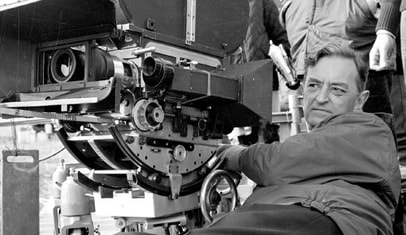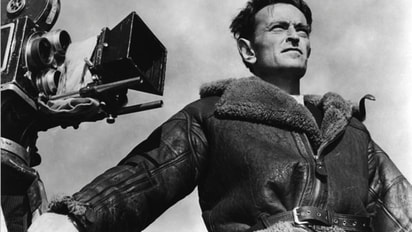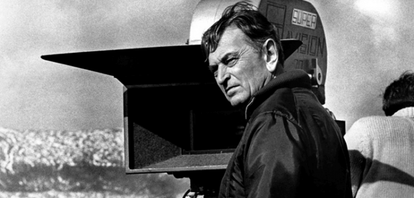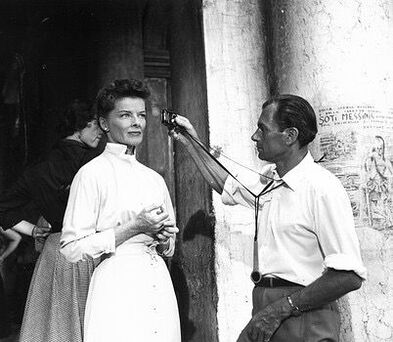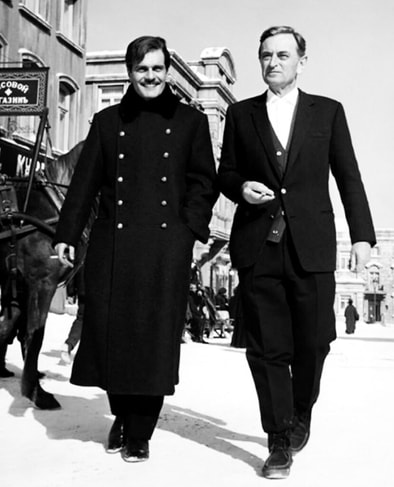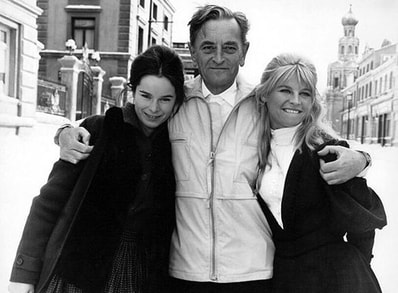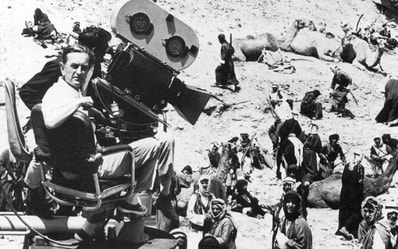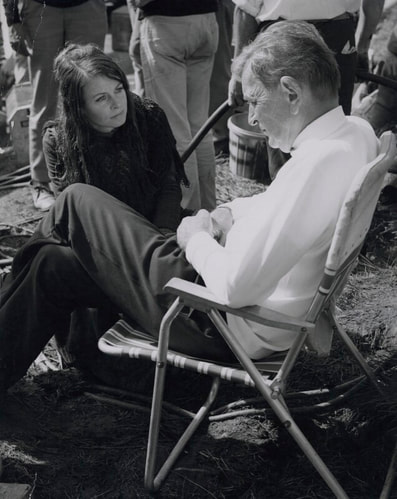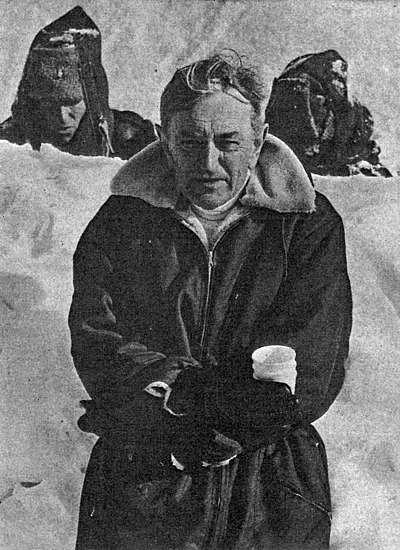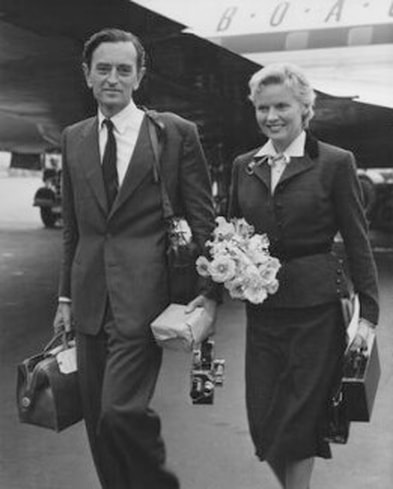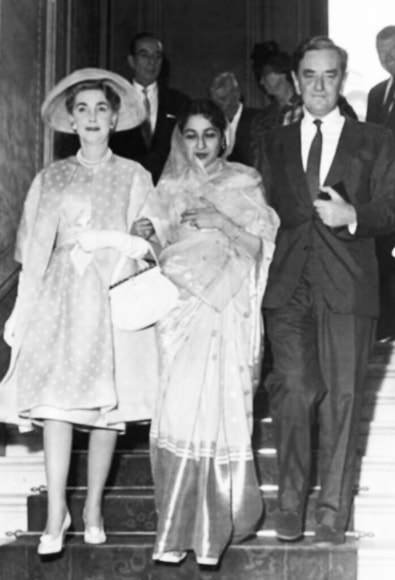|
Sir David Lean CBE (25 March 1908 – 16 April 1991) was an English film director, producer, screenwriter and editor. Widely considered one of the most influential directors of all time, Lean directed the large-scale epics The Bridge on the River Kwai (1957), Lawrence of Arabia (1962), Doctor Zhivago (1965), and A Passage to India (1984). He also directed two adaptations of Charles Dickens novels, Great Expectations (1946) and Oliver Twist (1948), as well as the romantic drama Brief Encounter (1945). Originally a film editor in the early 1930s, Lean made his directorial debut with 1942's In Which We Serve, which was the first of four collaborations with Noël Coward. Beginning with Summertime in 1955, Lean began to make internationally co-produced films financed by the big Hollywood studios; in 1970, however, the critical failure of his film Ryan's Daughter led him to take a fourteen-year break from filmmaking, during which he planned a number of film projects which never came to fruition. In 1984 he had a career revival with A Passage to India, adapted from E. M. Forster's novel; it was an instant hit with critics but proved to be the last film Lean would direct. Lean's affinity for pictorialism and inventive editing techniques has led him to be lauded by directors such as Steven Spielberg, Stanley Kubrick, Martin Scorsese, and Ridley Scott. Lean was voted 9th greatest film director of all time in the British Film Institute Sight & Sound "Directors' Top Directors" poll in 2002. Nominated seven times for the Academy Award for Best Director, which he won twice for The Bridge on the River Kwai and Lawrence of Arabia, he has seven films in the British Film Institute's Top 100 British Films (with three of them being in the top five) and was awarded the AFI Life Achievement Award in 1990. BiographyDavid Lean was born on 25 March 1908 at 38 Blenheim Crescent, South Croydon, Surrey (now part of Greater London), to Francis William le Blount Lean and the former Helena Tangye. His parents were Quakers and he was a pupil at the Quaker-founded Leighton Park School in Reading. His younger brother, Edward Tangye Lean (1911–1974), founded the original Inklings literary club when a student at Oxford University. When Lean was aged ten, his uncle gave him a Brownie box camera. "You usually didn't give a boy a camera until he was 16 or 17 in those days. It was a huge compliment and I succeeded at it.' Lean printed and developed his films, and it was his 'great hobby'. Lean was a half-hearted schoolboy with a dreamy nature who was labeled a "dud" of a student. In 1923, his father deserted the family and Lean would later follow a similar path after his own first marriage and child. In the Christmas Term of 1926, Lean left school at the age of 18 and entered his father's chartered accountancy firm as an apprentice. Bored by his work, Lean spent every evening in the cinema, and in 1927, after an aunt had advised him to find a job he enjoyed, he visited Gaumont Studios where his obvious enthusiasm earned him a month's trial without pay. He was taken on as a teaboy, promoted to clapperboy, and soon rose to the position of third assistant director. By 1930 he was working as an editor on newsreels, including those of Gaumont Pictures and Movietone, while his move to feature films began with Freedom of the Seas (1934) and Escape Me Never (1935). He has also edited two film productions of two George Bernard Shaw plays, Pygmalion (1938) and Major Barbara (1941). Lean began his directing career, after editing more than two dozen features by 1942. His first work as a director was in collaboration with Noël Coward on In Which We Serve (1942), and he later adapted several of Coward's plays into successful films, including This Happy Breed (1944), Blithe Spirit (1945) and Brief Encounter (1945). The film shared Grand Prix honors at the 1946 Cannes film festival and garnered Lean his first Academy nominations for directing and screen adaptation, and Celia Johnson who played the female lead a nomination for Best Actress. It has since become a classic, one of the most highly regarded British films. Two celebrated Charles Dickens adaptations followed – Great Expectations (1946) and Oliver Twist (1948). The next film directed by Lean was The Passionate Friends (1949), an atypical Lean film, and the first of three films to feature the actress Ann Todd, who became his third wife. The last of the films with Todd, The Sound Barrier (1952), has a screenplay by the playwright Terence Rattigan and was the first of his three films for Sir Alexander Korda's London Films. Summertime (1955) marked a new departure for Lean. It was partly American financed, although again made for Korda's London Films. The film features Katharine Hepburn in the lead role as a middle-aged American woman who has a romance while on holiday in Venice. It was shot entirely on location there. Lean's films now began to become infrequent but much larger in scale and more extensively released internationally. The Bridge on the River Kwai (1957) was based on a novel by Pierre Boulle recounting the story of British and American prisoners of war trying to survive in a Japanese prison camp during the Second World War. The film stars William Holden and Alec Guinness and became the highest-grossing film of 1957 in the United States. It won seven Academy Awards, including Best Picture, Best Director, and Best Actor for Alec Guinness, who had battled with Lean to give more depth to his role as an obsessively correct British commander who is determined to build the best possible bridge for his Japanese captors in Burma. After extensive location work in the Middle East, North Africa, Spain, and elsewhere, Lean's Lawrence of Arabia was released in 1962. It recounts the life of T. E. Lawrence(played by Peter O'Toole), the British officer who is depicted in the film as uniting the squabbling Bedouin peoples of the Arab peninsula to fight in World War I and then push on for independence. French composer Maurice Jarre, on his first Lean film, created a soaring film score with a famous theme and won his first Oscar for Best Original Score. The film turned actor Peter O'Toole, playing Lawrence, into an international star, and was nominated for ten Oscars and won seven, including Best Picture and Lean's second win for Best Director. He remains the only British director to win more than one Oscar for directing. Lean had his greatest box-office success with Doctor Zhivago (1965), a romance set during the Russian Revolution. The film, based on the banned novel by Nobel Prize-winning Russian poet Boris Pasternak, tells the story of a brilliant and warm-hearted physician and poet Yuri (played by Omar Sharif) who, while seemingly happily married into the Russian aristocracy, and a father, falls in love with a beautiful abandoned young mother named Lara (played Julie Christie) and struggles to be with her in the chaos of the Bolshevik revolution and subsequent Russian Civil War. As of 2020, it is the 9th highest-grossing film of all time, adjusted for inflation. Producer Carlo Ponti used Maurice Jarre's lush romantic score to create a pop tune called "Lara's Theme", which became an international hit song with lyrics under the title "Somewhere My Love", one of cinema's most successful theme songs. The British director of photography, Freddie Young, won an Academy Award for his color cinematography. Lean's Ryan's Daughter (1970) was released after an extended period on location in Ireland. A doomed romance set against the backdrop of 1916 Ireland's struggles against the British, it is loosely based on Gustave Flaubert's Madame Bovary. The film received far fewer positive reviews than the director's previous work, being particularly savaged by the New York critics. Nonetheless, the film was a box office success, earning $31 million and making it the 8th highest-grossing film of that year. It won two Academy Awards the following year, another for cinematographer Freddie Young. The poor critical reception of the film prompted Lean to meet with the National Society of Film Critics, gathered at the Algonquin Hotel in New York, including The New Yorker's Pauline Kael, and ask them why they objected to the movie. These critics so lacerated the film for two hours to David Lean's face that the devastated Lean was put off from making films for a long time. During the last years of his life, Lean was in pre-production of a film version of Joseph Conrad's Nostromo. From 1977 until 1980, Lean and Robert Bolt worked on a film adaptation of Captain Bligh and Mr. Christian, a dramatized account by Richard Hough of the Mutiny on the Bounty. After Bolt suffered a serious stroke and was unable to continue writing, however, Lean was forced to abandon the project after overseeing casting and the construction of the $4 million Bounty replica as the director felt that Bolt's involvement would be crucial to the film's success. The film's producer, Italian mogul Dino De Laurentiis did not want to lose the millions he had already put into the project over what he thought was as insignificant a person as the director dropping out. The film was eventually released as The Bounty. Lean then embarked on a project he had pursued since 1960, a film adaptation of A Passage to India (1984), from E. M. Forster's 1924 novel of colonial conflicts in British-occupied India. Entirely shot on location in the sub-continent, this became his last completed film. He rejected a draft by Santha Rama Rau, responsible for the stage adaptation and Forster's preferred screenwriter, and wrote the script himself. In addition, Lean also edited the film with the result that his three roles in the production (writer, editor, director) were given equal status in the credits. Lean recruited long-time collaborators for the cast and crew, including Maurice Jarre (who won another Academy Award for the score), Alec Guinness in his sixth and final role for Lean, as an eccentric Hindu Brahmin, and John Box, the production designer for Dr. Zhivago. The film opened to universally enthusiastic reviews and was nominated for eleven Academy Awards and Lean himself nominated for three Academy Awards in directing, editing, and writing. His female star, an English woman played by Australian actress Judy Davis her first Academy nomination. Peggy Ashcroft, as the sensitive Mrs. Moore, won the Oscar for best supporting actress, making her, at 77, the oldest actress to win that award. He was signed on to direct a Warner Bros.-backed adaptation of J. G. Ballard's autobiographical novel Empire of the Sun. Steven Spielberg, who was brought on board as a producer for Lean, later assumed the role of director when Lean dropped out of the project; Spielberg was drawn to the idea of making the film due to his long-time admiration for Lean and his films. Empire of the Sun was released in 1987. The Nostromo project involved several writers whose work was abandoned. In the end, Lean decided to write the film himself with the assistance of Maggie Unsworth with whom he had worked on the scripts for Brief Encounter, Great Expectations, Oliver Twist, and The Passionate Friends. Nostromo had a total budget of $46 million and was six weeks away from filming at the time of Lean's death from throat cancer and interment at Putney Vale Cemetery. Nostromo was finally adapted for the small screen with an unrelated BBC television mini-series in 1997. Lean was appointed Commander of the Order of the British Empire (CBE) in 1953, and was knighted for his contributions and services to the arts in 1984. Lean received the AFI Life Achievement Award in 1990. Lean was married six times, had one son, and at least two grandchildren—from all of whom he was completely estranged—and was divorced five times. He was survived by his last wife, art dealer Sandra Cooke, the co-author (with Barry Chattington) of David Lean: An Intimate Portrait (2001),[10] as well as Peter Lean, his son from his first marriage. His six wives were:
In 1999, the British Film Institute compiled its list of the Top 100 British films; seven of Lean's films appeared on the list:
He directed more films that won the Academy Award for Best Cinematography at the Oscars than any other director, with five wins out of six nominations for Great Expectations, The Bridge on the River Kwai, Lawrence of Arabia, Doctor Zhivago and Ryan's Daughter—the last nomination being for A Passage to India. As Lean himself pointed out, his films are often admired by fellow directors as a showcase of the filmmaker's art. Lean was also notorious for his perfectionist approach to filmmaking; director Claude Chabrol stated that he and Lean were the only directors working at the time who were prepared to wait "forever" for the perfect sunset, but whereas Chabrol measured "forever" in terms of days, Lean did so in terms of months.
Steven Spielberg and Martin Scorsese in particular are fans of Lean's epic films and claim him as one of their primary influences. Spielberg and Scorsese also helped in the 1989 restoration of Lawrence of Arabia, which had been substantially altered both by the studio in theatrical release and in particular in its televised versions; the theatrical re-release greatly revived Lean's reputation. Several of the many other later twentieth century directors who have acknowledged significant influence by Lean include Stanley Kubrick, George Lucas, Spike Lee, and Sergio Leone.
0 Comments
Leave a Reply. |
Categories
All
Archives
December 2023
|
